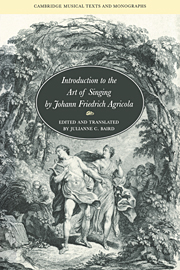Book contents
- Frontmatter
- Contents
- Acknowledgments
- Introduction: Agricola's treatise
- INTRODUCTION TO THE ART OF SINGING
- Translator's preface
- Foreword of the author
- Introduction of the author
- 1 Observations for the use of the singing teacher
- 2 Concerning appoggiaturas
- 3 Concerning trills
- 4 Concerning divisions
- 5 Concerning recitative
- 6 Remarks intended especially for the music student
- 7 Concerning arias
- 8 Concerning cadenzas
- 9 Remarks for the use of the professional singer
- 10 Concerning improvised variations of melodies
- Notes
- Bibliography
- Index
4 - Concerning divisions
Published online by Cambridge University Press: 10 December 2009
- Frontmatter
- Contents
- Acknowledgments
- Introduction: Agricola's treatise
- INTRODUCTION TO THE ART OF SINGING
- Translator's preface
- Foreword of the author
- Introduction of the author
- 1 Observations for the use of the singing teacher
- 2 Concerning appoggiaturas
- 3 Concerning trills
- 4 Concerning divisions
- 5 Concerning recitative
- 6 Remarks intended especially for the music student
- 7 Concerning arias
- 8 Concerning cadenzas
- 9 Remarks for the use of the professional singer
- 10 Concerning improvised variations of melodies
- Notes
- Bibliography
- Index
Summary
1. Although divisions, in themselves, lack the power to evoke the charm that touches the heart, since they serve mainly to engender admiration of the singer for his good fortune in having a flexible voice, it is, nevertheless, very necessary that the teacher instruct his student well in them, so that the latter learns to execute them with ease, speed, and the correct intonation. For when they are performed at the appropriate place, they certainly deserve applause and make the singer generally capable of singing, and in all styles.
2. He who has allowed the voice of a student to be so lazy that he always drags teaches him only the smallest part of his craft and incapacitates him for learning the greater part. With pieces that must be performed in a fast tempo and probably even with those in moderately fast tempos, whoever does not have an agile voice bores [lit., annoys] the audience into such sleepy indifference that they almost fall out of their seats [lit., down]; and the constant lagging causes everything he sings almost always to sound out of tune.
3. It is commonly agreed that there are two types of divisions: the detached and the slurred. Because of its slowness, the drag deserves to be classified more as an extempore ornament than as a division.
- Type
- Chapter
- Information
- Introduction to the Art of Singing by Johann Friedrich Agricola , pp. 151 - 170Publisher: Cambridge University PressPrint publication year: 1995



